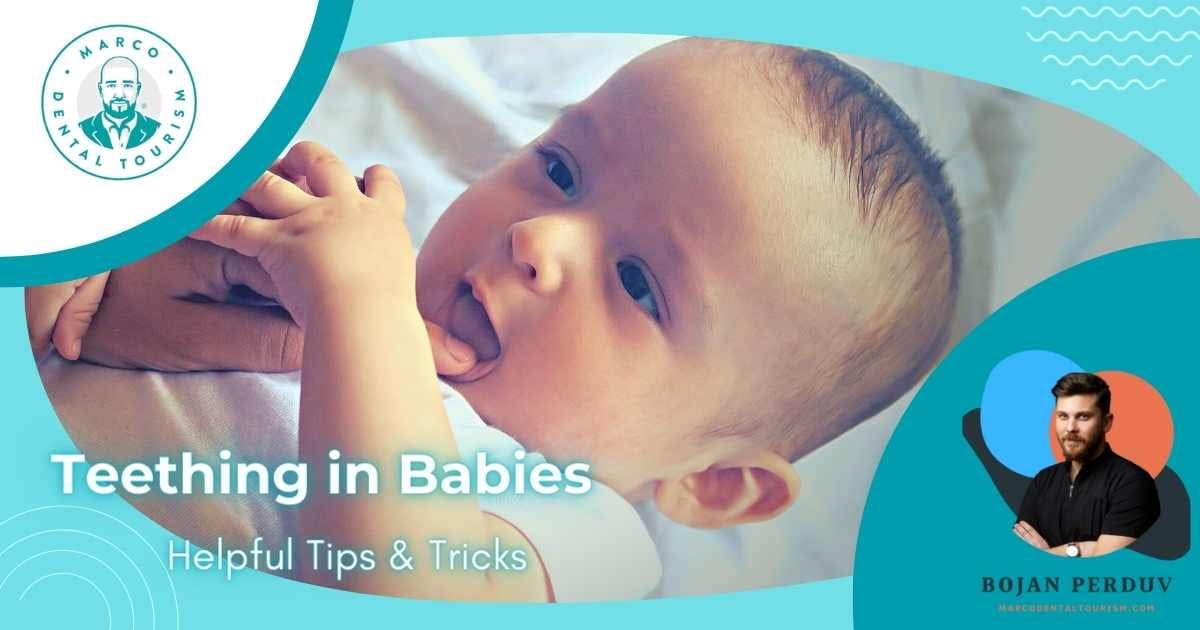Teething in Babies
Teething is a natural process that occurs in accordance with the individual development of the child, but sometimes it can cause discomfort and pain in babies. In this article, we will focus on all aspects of teething, from symptoms and discomforts to proper hygiene and nutrition, and we will also provide useful tips to help babies ease the discomforts that occur during this stage of life.

What are the symptoms of teething in babies?
Symptoms of teething can include nervousness, redness, and swelling of the gums, increased salivation, changes in the baby's appetite, fever, and sleeping problems. Also, a baby may notice the need to chew and bite a toy or a pacifier in order to relieve pain and discomfort.

How to recognize early teething in babies?
Early teething usually starts with pain and sensitive gums, so babies often bite objects or put their fingers in their mouths. Redness and swelling of the gums can also be observed. In some cases, small white dots can be seen at the bottom of the gums that indicate the beginning of teething.
How does the baby's behavior change during teething?
Due to the pain or discomfort caused by teething, babies can become moody, irritable, and prone to crying, and they can also have problems sleeping and eating. Also, some changes in behavior can be observed in babies, such as the desire to suck their thumbs or put toys in their mouths.

When are babies expected to have their first teeth?
In most cases, babies' first teeth begin to erupt between 6 and 10 months of age. However, some babies can have teeth as early as the 3rd month or later during the first year of life. It is important to note that each child has its own individual development path, so it is possible that the teeth appear earlier or later than the expected period.

Is there an order in which baby teeth erupt?
Yes, baby teeth usually appear in a certain order, with the two lower front teeth (central incisors) usually appearing first, followed by the two upper front teeth.
Is late teething a cause for concern?
While most babies get their first tooth in the typical 6 to 10-month range, delayed teething is not necessarily a cause for concern as long as there are no other teething delays. Some babies may not get their first tooth until their first year of life.
How long does baby teething last?
Teething can last from a few days to a few months, but on average it takes about 8 days for one tooth to erupt.
How long does it take for all the teeth to grow in?
It can take up to 2-3 years for all the baby's teeth to grow. The first teeth to appear are usually the lower front teeth, followed by the upper ones. Next come the first molars, then the canines, and finally the second molars. However, each baby is unique and may experience teething differently. Some babies may get teeth earlier or later than others.

What are the most common problems that babies experience during teething?
Teething can cause a number of problems for the baby. Some of the most common problems that occur are:
- Restlessness and irritability
- Biting and chewing objects
- Swelling and sensitivity of the gums
- Loss of appetite or refusal to eat
- Difficulty sleeping
- Rubbing ears or cheeks
- High temperature

How can teething affect a baby's sleep?
Teething can disrupt a baby's sleep, causing discomfort and pain during sleep. In addition, increased drooling during teething can lead to skin irritation and difficulty breathing, which can disturb babies' comfortable and peaceful sleep.
Is fever during teething a cause for concern?
A low temperature during teething is common and usually not a cause for concern. However, if the temperature is elevated for days or if it is accompanied by other symptoms such as vomiting or diarrhea, it is important to contact your pediatrician.
How can teething pain be alleviated in babies?
To ease your baby's pain and discomfort, try cold compresses or using baby teethers. Here are a few more ways to make it easier for your baby to start teething:
- Use cold compresses: Cold compresses can reduce pain and swelling. Use a clean cloth and cool it down for a few minutes before offering it to your baby to chew or put on his gums.
- Offer your baby a chewer: Chewing can reduce teething pain as it helps the teeth erupt. Offer solid chewable items such as cooled baby chews.
- Massage your baby's gums: Gently massaging the gums can ease the pain. Before doing this, be sure to wash your hands to avoid any infection. Gently massage your child's gums in a circular motion.
- Consult your dentist: The dentist will give you the best advice on how to help your baby with teething.
- Maintain the hygiene of the baby's teeth: Gently wipe the baby's gums with a damp cloth after each meal. Also, make sure that the child does not take too many sweet drinks and foods, as this can worsen the symptoms.

What are the natural remedies for teething pain in babies?
Natural remedies for teething pain in babies include cold and soft foods such as pureed fruit or yogurt, as well as applying a small amount of diluted clove oil to the gums.
How to use baby teething gel during teething?
First, check with the dentist whether the tooth gel is adequate for your baby's teeth. It is usually recommended to apply a small amount of gel to the tip of a finger or to a baby toothbrush and gently massage the baby's gums. It is important not to exceed the recommended dose and not to use the gel daily.
How to maintain oral hygiene in babies during teething?

Proper care of a baby's oral hygiene involves daily care of the baby's teeth as well as regular dental visits after the first tooth erupts. In addition, you can clean your baby's gums with a clean, damp cloth or gauze after feeding. Once your baby's teeth start coming in, you can start brushing with a soft-bristled toothbrush and a rice-sized amount of baby-friendly toothpaste.
How does nutrition affect teeth development and health in babies?

A proper diet can help prevent cavities and other dental problems in babies, while an unhealthy diet can cause tooth decay over time. When the child starts eating solid food, it is important to avoid foods rich in sugar. Sugar turns into acid in the mouth which can lead to tooth decay. Instead, the baby should get used to a varied diet rich in vitamins, vegetables, and fruits.
What foods are good for a baby when teething?
Foods rich in calcium and vitamin D, such as dairy products, leafy vegetables and fortified cereals, can help maintain healthy teeth and bones during teething. Soft, pureed foods like bananas and boiled sweet potatoes can also be easier for babies to eat during this time.

What food and drink should be avoided during teething?
Avoid giving your baby sweet foods or drinks that can increase the risk of tooth decay. Also, during the baby's development, you should avoid crunchy, hard, as well as strong food that the baby cannot easily chew and digest. Follow the diet recommended by the doctor adapted to the baby's development and age.
What do babies' gums look like when they are teething?
Babies' gums may appear swollen, red, and tender, but should not have pus or drainage. If you notice any change that could be a sign of an infection in your baby's gums, you should contact your pediatrician or children's dentist.
How many days does fever last during teething in babies?
A low fever associated with teething usually lasts for several days and should not exceed 38 degrees. If the temperature persists or is accompanied by other symptoms, contact your doctor.

Does teething affect a baby's sleep?
Yes, teething can cause discomfort and pain that can disrupt a baby's sleep, leading to the baby waking up more often during the night. It's important to establish a regular bedtime routine and soothe your baby with a lullaby or song to help him fall asleep more easily.
Our conclusion about teething in babies
In this blog, we dealt with the topic of teething in babies, which is a challenge for both babies and parents. In order to facilitate the process of teething and mastering this period, we have offered several expert tips that have proven to be very useful and effective through experience.


















Share your opinion!
What do you think about this topic?
Comments (0)